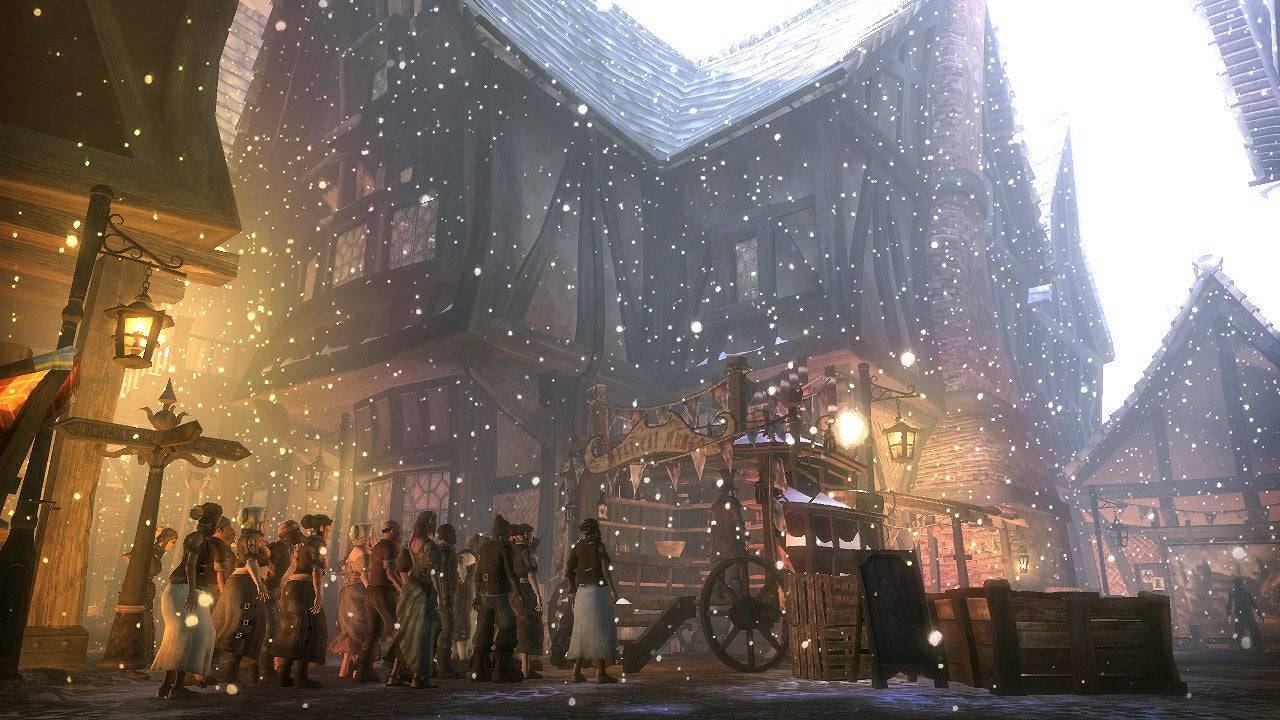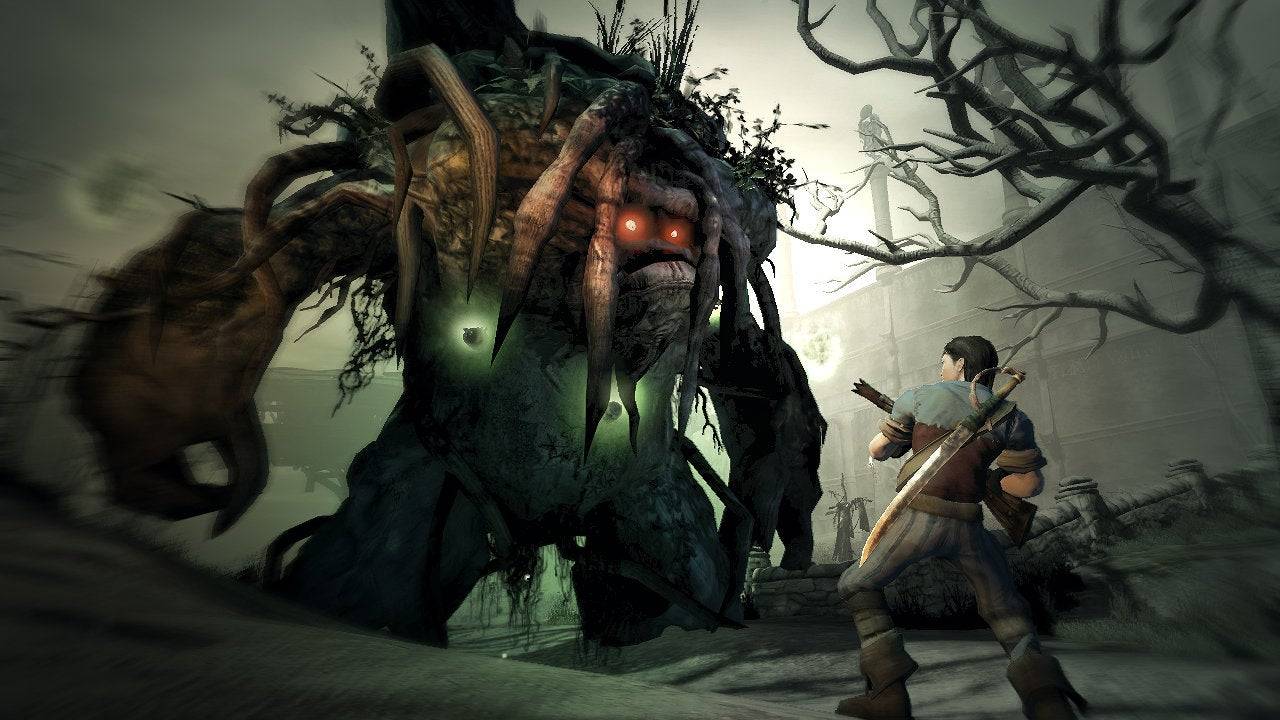by Andrew Apr 17,2025
Buried like some kind of cursed treasure at the bottom of this week's episode of the official Xbox Podcast was news about Playground Games' long-awaited Fable. I call it "treasure" because it included a rare glimpse at gameplay, but "cursed" because it came with that dreaded caveat that accompanies so many development updates: a delay. Once planned to launch this year, Fable is now set for a 2026 release.
Delays, of course, are generally not harbingers of doom, despite the agonizing wait they inflict. In Fable's case, hopefully, this is a sign of a richly detailed world that just needs more time to bloom. But that extra year of waiting can be put to good use: there's no better time to play the Fable games. Specifically, I'd urge you to try Fable 2, the series' highpoint, and (re)discover just what a strange and unique RPG Lionhead Studios' 2008 classic is.
By today's role-playing game standards, Fable 2 is truly unusual. Even compared to its 2008 contemporaries, including the likes of Fallout 3 and BioWare's early 3D games, it stands out with its singular vision. While Fable 2 features a fairly traditional campaign structure, with a linear main story and an eclectic collection of optional side quests, its RPG systems are a far cry from the intricate stat blocks of Oblivion and Neverwinter Nights. It streamlines these elements to create an incredibly approachable experience, perfect for those who find a D&D character sheet as decipherable as hieroglyphics.
Just six main skills govern your health pool, strength, and speed. There's only a single damage stat to consider for weapons, and none for armor or buff-providing accessories. Combat, prevalent throughout most quests, remains straightforward yet engaging, enhanced by creative spellcasting, such as the entertaining Chaos spell, which forces enemies to dance and scrub floors. Even death is lenient, with the only penalty being a minor XP deduction.
In short, Fable 2 is the RPG for those new to the genre. Back in 2008, when Oblivion's vast open world may have felt overwhelming, Fable 2's Albion offered a more manageable series of small, easy-to-navigate maps. You can freely move between these areas, and with your faithful canine companion alerting you to adventures, you can explore beyond the beaten path to uncover secrets like buried treasure, sunken caves, and the puzzle-laden Demon Doors. This lends the world a sense of scale and opportunity that belies its actual size. However, Albion's geography is somewhat restrictive, guiding you down linear pathways from one landmark to another, making it less about getting lost in the traditional sense.
While Albion's physical expanse may not compare to the vast worlds of BioWare's Infinity Engine games or Bethesda's Morrowind, judging it by modern or contemporary RPG standards does it a disservice. Fable 2's focus isn't on exploring distant mountains or delving into dungeons with myriad routes, but rather on a world teeming with life. Viewed through the lens of a game like Maxis' The Sims, Fable 2 presents a remarkable simulation of society.

Albion operates like a strange, organic clockwork organism. Every morning, as the sun rises, its inhabitants begin their daily routines. Town criers announce shop openings and, as night falls, remind everyone of the late hour. Like families in The Sims, every citizen of Albion has an inner life, driven by their roles, likes, and dislikes. Through an ever-expanding library of gestures, you can delight, insult, impress, or seduce non-hostile characters. A well-executed fart might have pub patrons howling into their beers, while pointing and laughing at children could send them running to their parents. These emotes allow you to influence the people of Albion, charming them with your heroism or alienating them with your villainy. While we often talk about reactive NPCs and living game worlds, nothing quite matches Fable 2's unique approach.
As a Hero with a capital H, destined for grand adventures, bullying bandits, and finding treasure, Fable 2 is even more engaging when you immerse yourself in its society. Almost every building in Albion is available for purchase, whether houses or shops, and you can buy them with money earned from jobs like woodcutting or blacksmithing, which become soothing distractions. With a house key in hand, you can become a landlord, setting fair or extortionate rents, or make it your home, furnishing it to your taste. Then, there's the next step: wooing the most attractive NPC by repeatedly using their favorite emote until they fall into your bed, leading to a comedic romance and eventually, a baby. Individually, these components feel artificial, yet together, they create a genuine sense of life.
Few, if any, RPGs have followed Fable's lead in this regard. Even the towering achievements of Baldur's Gate 3 don't include organic romances or property market gameplay. However, Albion's authentic sense of life finds a more unexpected successor in Red Dead Redemption 2. Rockstar's recreation of the old West is highly responsive, with NPCs that react believably to your presence and behavior. Every NPC can be interacted with using a system reminiscent of Fable 2's gestures, and your demeanor can delight or annoy. While most interactions are simple, those you touch in more meaningful ways may remember and repay you later. If Playground's new Fable is to stay true to its origins, it should take inspiration from Rockstar's living world rather than the current trend of tabletop-inspired RPGs.
There are other essential elements Playground will need to preserve. Fable's incredibly British sense of humor must be maintained, with its dry, witty satire of the class system and a healthy dose of humor. The game should also feature a cast of beloved thespians, as seen with Richard Ayoade and Matt King in trailers. But perhaps most importantly, beyond the bustling world, is Lionhead's trademark approach to good and evil.

Peter Molyneux, the founder of Lionhead Studios and lead designer of the Fable series, has always been fascinated by the dichotomy of good and evil. This was evident from the studio's first project, the god game Black & White, and continued throughout Molyneux's career, including his upcoming Masters of Albion. But Lionhead's approach to player choice is far from the nuanced decisions seen in The Witcher or BioWare's best works. In Fable 2, your choices are either purely angelic or despicably demonic, with no grey area in between. It thrives on comedic extremes; an early side quest might have you either clearing pests from a trader's warehouse or destroying all his stock. Later, a ghost who killed himself after being jilted at the altar might ask you to torment his former lover, with your only options being to make her life a living hell or marry her.
The past decade of RPG development has emphasized ultimate player expression through choices that explore a spectrum of human behavior. Moral dilemmas are now seen as more complex than choosing between saving children or burning them alive. Fable, however, thrives on binary choices. It revels in the opportunity for you to be the most heroic hero or the most heinous villain. This was established in the first game, where choosing evil options could result in your character growing devil horns, but it truly flourished in Fable 2. The sequel's quests branch to offer good or evil pathways in richer, more creative ways, while the reactive world allows your actions to shape your reputation and moral alignment. Moral-focused outcomes in RPGs can often feel underwhelming because they focus on the middle ground rather than the extremes. Fable 2, however, embraces the extremes, allowing you to go full Sith with matching lightning powers, and it works because it only has two paths to juggle.
It's not yet clear if Playground Games will capture this essence of Fable. While this week's development update included 50 seconds of pre-alpha gameplay footage, it didn't fully convey the authentic Fable experience, aside from the obligatory chicken kick. But a minute of contextless footage can't tell the whole story.
What we can see in those brief seconds is a more detailed world than Fable has ever seen. The main character's horse suggests a more open world than the 360-era games, and the rendered forest hints at the possibility of truly getting lost in this new Albion. The brief city shot, dense and full of life, gives hope that Playground Games have stayed true to the Sims-like simulation of society that makes Fable 2 so unique. I look forward to engaging with its children, dancing on pub tables, and having whirlwind romances behind the green grocers.
But all of that is a year away. In the meantime, you can revisit or experience Fable 2 for the first time. You'll quickly understand why it's so beloved and why it's crucial for Playground Games to retain all its quirks. What we don't need is a Fable reimagined as a Witcher clone, a Baldur's Gate-alike, or a Dragon Age-style RPG. We just need Fable to be Fable, farts and all.
Zenless Zone Zero Update Cycle Leak Hints at Future Content cadence
All Mavuika Materials, Kit, and Constellations in Genshin Impact
Counterfeit Bank Simulator: Minting Solution for Economic Crises
Marvel Rivals: Season 1 Dracula Explained
Best Xbox Game Pass Games For Kids (January 2025)
Solo Leveling: Global Tournament Draws Near
Power Rangers: Uncover Hidden Secrets in Rita's Carnival and Cemetery
Roblox: Anime Auras RNG Codes (January 2025)